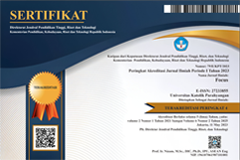Konsep ‘Imago Dei’ Emmanuel Levinas
DOI:
https://doi.org/10.26593/focus.v1i1.4087Keywords:
Levinas, Imago Dei, wajah, eksistensialis,Abstract
One’s Identity is a vital component of a human life. Identity is important, es- pecially considering when oneself is sometimes subjected to the judgment of others. Emmanuel Levinas initiated the concept of the ‘Imago Dei’ to reduce negative judgment whilst simultaneously elevating individual uniqueness based upon our natures as im- ages of God. The idea of ‘imago Dei’ manifests in one’s face. Our visage then becomes a non-verbal media of communication akin to a conversation expressing one’s identity whereas a dialectical exchange would otherwise prove cumbersome. An understanding of the ‘imago Dei’ brings people towards the awareness of their statuses as God’s cre- ations, creations most associated with Him to the extent he deigned designated them His very images.References
Cairns, David. The Image of God in Man. London: Collins Press, 1973.
Cohen, Richard A. Time and the Other. Pittsburgh: Duquesne University Press, 1987.
Hand, Seán. Difficult Freedom: Essays on Judaism. London: Athlone, 1991.
Levinas, Emmanuel. Ethics and Infinity: Conversations with Philippe Nemo. Richard A. Cohen (trans.). Pittsburgh: Duquesne University Press, 1985.
_____. Totality and Infinity: An Essay on Exteriority. Alphonso Lingis (trans.). Pittsburgh: Duquesne University Press, 1969.
_____. Otherwise than Being or Beyond Essence. Alphonso Lingis (trans.). The Hague, The Netherlands: Martinus Nijhoff, 1974.
Zornberg, Avivah Gottlieb. The Particulars of Rapture: Reflections of Exodus. New York: Doubleday, 2002.

Downloads
Published
Issue
Section
License
Copyright (c) 2020 FOCUS

This work is licensed under a Creative Commons Attribution-ShareAlike 4.0 International License.



















